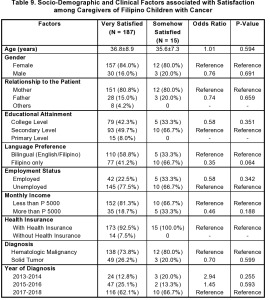
Contributions
Abstract: PB1739
Type: Publication Only
Session title: Quality of life, palliative care, ethics and health economics
Background
Patient Navigators are trained to provide support and guidance to patients throughout the cancer care continuum. They help 'navigate' through the maze of doctors' clinics, outpatient centers, insurance and payment systems, patient-support organizations, and other components of the health care system. Yet, there is no existing patient satisfaction tool to assess the patient navigation program in the Philippines for pediatric cancer.
Aims
This study aims to evaluate satisfaction with the patient navigation program using a validated Satisfaction with Interpersonal Relationship with Navigator (SN-I-Ph) Measure among Filipino caregivers in a tertiary referral center for childhood cancer.
Methods
The tool was first translated for cultural appropriateness, translated and back translated into Filipino and the content validity and internal consistency were tested. Caregivers of Filipino children with cancer were then recruited to answer the survey and the results analyzed.
Results
The SN-I-Ph was modified for cultural appropriateness; content validity for all 9 items was acceptable with score of 4.5-5 and internal consistency showed satisfactory results with cronbach alpha of 0.9067. A total of 202 participants were recruited to join the survey. Results showed mean±SD of 42.6±7.8. All of the 9 items showed excellent satisfaction. The socio-demographic and clinical factors showed no clinical significance with p value showing >0.05.

Conclusion
This study showed good satisfaction with the interpersonal relationship of the navigators among caregivers. Participants enrolled in the patient navigation program reported a positive overall experience with the medical care.
Keyword(s): Cancer, Pediatric
Abstract: PB1739
Type: Publication Only
Session title: Quality of life, palliative care, ethics and health economics
Background
Patient Navigators are trained to provide support and guidance to patients throughout the cancer care continuum. They help 'navigate' through the maze of doctors' clinics, outpatient centers, insurance and payment systems, patient-support organizations, and other components of the health care system. Yet, there is no existing patient satisfaction tool to assess the patient navigation program in the Philippines for pediatric cancer.
Aims
This study aims to evaluate satisfaction with the patient navigation program using a validated Satisfaction with Interpersonal Relationship with Navigator (SN-I-Ph) Measure among Filipino caregivers in a tertiary referral center for childhood cancer.
Methods
The tool was first translated for cultural appropriateness, translated and back translated into Filipino and the content validity and internal consistency were tested. Caregivers of Filipino children with cancer were then recruited to answer the survey and the results analyzed.
Results
The SN-I-Ph was modified for cultural appropriateness; content validity for all 9 items was acceptable with score of 4.5-5 and internal consistency showed satisfactory results with cronbach alpha of 0.9067. A total of 202 participants were recruited to join the survey. Results showed mean±SD of 42.6±7.8. All of the 9 items showed excellent satisfaction. The socio-demographic and clinical factors showed no clinical significance with p value showing >0.05.

Conclusion
This study showed good satisfaction with the interpersonal relationship of the navigators among caregivers. Participants enrolled in the patient navigation program reported a positive overall experience with the medical care.
Keyword(s): Cancer, Pediatric


